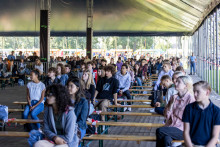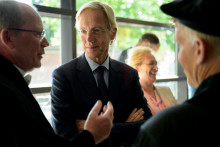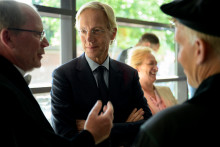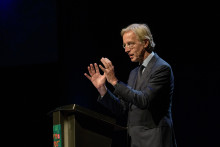The university is also unable to share an official statement regarding the recruitment freeze for the time being, states Van der Velde. ‘We will first analyse the minister’s new letter. There is no sense of panic within the organisation, but the situation is complex. For example, what is the difference between recruiting and informing? We will have to figure that out. We understand the feelings coming from the House of Representatives (Tweede Kamer, ed.) and we want to take those seriously. Even though some problems, like housing, play less of a role in this region.’
No recruitment activities planned
For the time being, the UT does not need to cancel any activities due to the recruitment freeze, says Van Der Velde. In the short term, being the coming weeks, there are no recruitment activities planned. The university already critically assessed its own activities previously, after Dijkgraaf urged to be ‘reserved’ regarding international recruitment. ‘Based on that, we decided to put our activities in Germany on hold, because those were not explicitly geared towards sectors with shortage like IT and technology.’
The call to stop recruiting international students stems from the House of Representatives. At the end of November a motion was adopted which states that universities and universities of applied science are no longer allowed to ‘actively’ recruit as long as there are no new regulations to keep the influx of international students in check. The motion was not received with praise from all sides. Eight administrators of higher education institutes, including the Chair of the UT’s Executive Board Vinod Subramaniam, wrote an opinion piece in the NRC [a Dutch newspaper] in which they emphasized the importance of international students.
update 9/1: letter to Dijkgraaf
In a recently sent letter to Minister Dijkgraaf, several educational institutions in Twente, including the UT, mayors and the Twente Board are urging not to stop the recruitment of international students. According to them, the recruitment of international talent is crucial for the Twente region and the eastern Netherlands, especially for IT and technology sectors. This region therefore continues to need (limited) growth, the signatories say.
‘Utmost restraint‘
In an initial reaction to the adopted motion, minister Dijkgraaf stated that institutes are already ‘utmost retraint’ regarding recruitment, but that they want to leave ‘some room’ to aid sectors coping with staffing shortage and shrinking regions. However, this was insufficient for members of parliament: they want institutes to completely suspend recruitment at once. Therefore, Dijkgraaf followed up with a second letter just before Christmas, in which he requests educational institutes to halt the active recruitment of international students for the time being.
This, incidentally, does not entail that international students are no longer welcome at Dutch universities: it only means the temporary suspension of recruitment activities. The halting procedure will at least last until February. That is when the minister will come with new proposals to properly guide the influx of international students.







